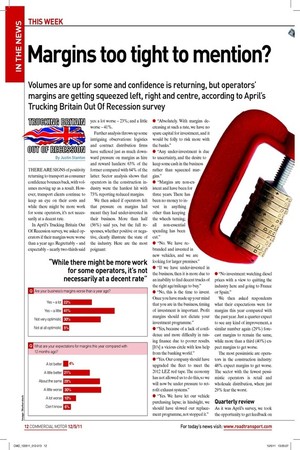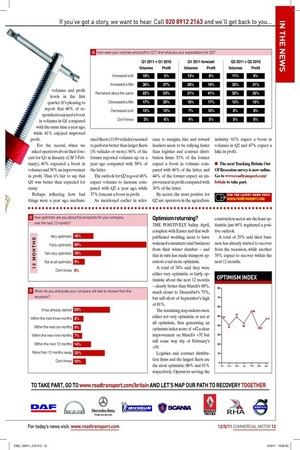Margins too tight to mention?
Page 10

Page 11

If you've noticed an error in this article please click here to report it so we can fix it.
Volumes are up for some and confidence is returning, but operators’ margins are getting squeezed left, right and centre, according to April’s Trucking Britain Out Of Recession survey
By Justin Stanton
THERE ARE SIGNS of positivity returning to transport as consumer conidence bounces back, with volumes moving up as a result. However, transport clients continue to keep an eye on their costs and while there might be more work for some operators, it’s not necessarily at a decent rate.
In April’s Trucking Britain Out Of Recession survey, we asked operators if their margins were worse than a year ago. Regrettably – and expectably – nearly two-thirds said yes: a lot worse – 23%; and a little worse – 41%.
Further analysis throws up some intriguing observations: logistics and contract distribution irms have suffered just as much downward pressure on margins as hire and reward hauliers: 63% of the former compared with 64% of the latter. Sector analysis shows that operators in the construction industry were the hardest hit with 73% reporting reduced margins.
We then asked if operators felt that pressure on margins had meant they had under-invested in their business. More than half (56%) said yes, but the full responses, whether positive or negative, clearly illustrate the state of the industry. Here are the most poignant: ● “Absolutely. With margins decreasing at such a rate, we have no spare capital for investment, and it would be folly to risk more with the banks.” ● “Any under-investment is due to uncertainty, and the desire to keep some cash in the business rather than squeezed margins.” ● “Margins are non-existent and have been for three years. There has been no money to in vest in anything other than keeping the wheels turning; all non-essential spending has been cut.” ● “No. We have re branded and invested in new vehicles, and we are looking for larger premises.” ● “If we have under-invested in the business, then it is more due to an inability to ind decent trucks of the right age/mileage to buy.” ● “No, this is the time to invest. Once you have made up your mind that you are in the business, timing of investment is important. Proit margins should not dictate your investment programme.” ● “Yes, because of a lack of conidence and more dificulty in raising inance due to poorer results. [It’s] a vicious circle with less help from the banking world.” ● “Yes. Our company should have upgraded the leet to meet the 2012 LEZ red tape. The economy has not allowed us to do this, so we will now be under pressure to retroit exhaust systems.” ● “Yes. We have let our vehicle purchasing lapse; in hindsight, we should have slowed our replacement programme, not stopped it.” ● “No investment: watching diesel prices with a view to quitting the industry here and going to France or Spain.” We then asked respondents what their expectations were for margins this year compared with the past year. Just a quarter expect to see any kind of improvement, a similar number again (29%) forecast margins to remain the same, while more than a third (40%) expect margins to get worse.
The most pessimistic are operators in the construction industry: 48% expect margins to get worse. The sector with the fewest pessimistic operators is retail and wholesale distribution, where just 29% fear the worst.
Quarterly review
As it was April’s survey, we took the opportunity to get feedback on volumes and proit levels in the irst quarter. It’s pleasing to report that 46% of respondents enjoyed a boost in volumes in Q1 compared with the same time a year ago, while 41% enjoyed improved proit.
For the record, when we
asked operators about their forecast for Q1 in January (CM 3 February), 40% expected a boost in volumes and 36% an improvement in proit. Thus it’s fair to say that Q1 was better than expected for many.
Perhaps relecting how bad things were a year ago, medium sized leets (11-50 vehicles) seemed to perform better than larger leets (51 vehicles or more): 66% of the former reported volumes up on a year ago compared with 58% of the latter.
The outlook for Q2 is good: 46% expect volumes to increase compared with Q2 a year ago, while 37% forecast a boost in proit.
As mentioned earlier in refer ence to margins, hire and reward hauliers seem to be rallying faster than logistics and contract distribution irms: 53% of the former expect a boost in volumes compared with 46% of the latter; and 44% of the former expect an improvement in proit compared with 30% of the latter.
By sector, the most positive for Q2 are operators in the agriculture industry: 61% expect a boost in volumes in Q2 and 47% expect a hike in proit.
● The next Trucking Britain Out Of Recession survey is now online. Go to www.roadtransport.com/ britain to take part.












































